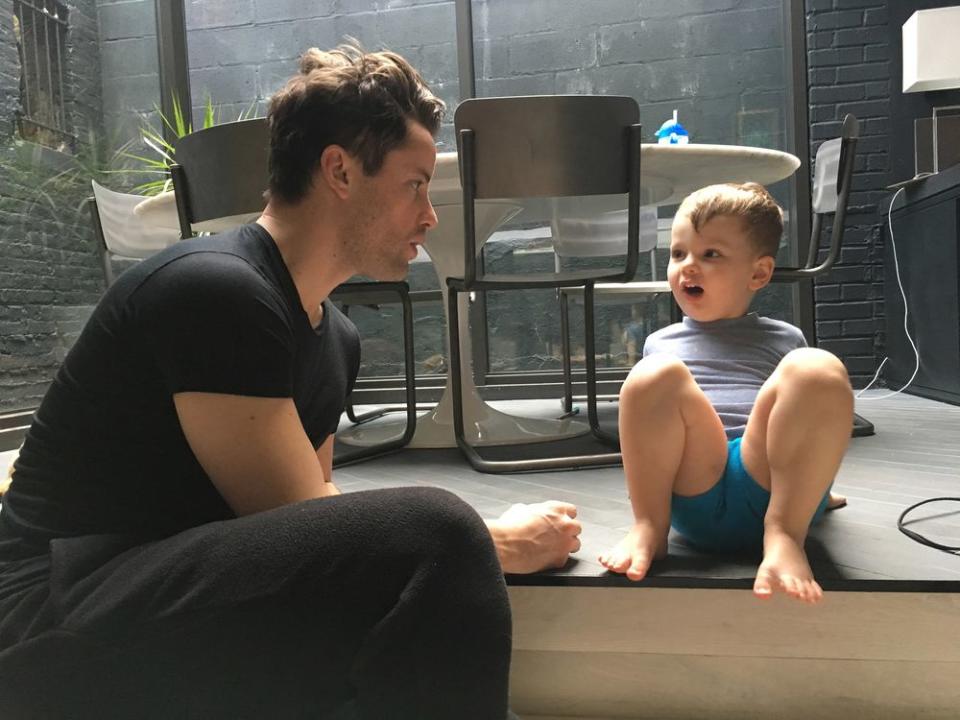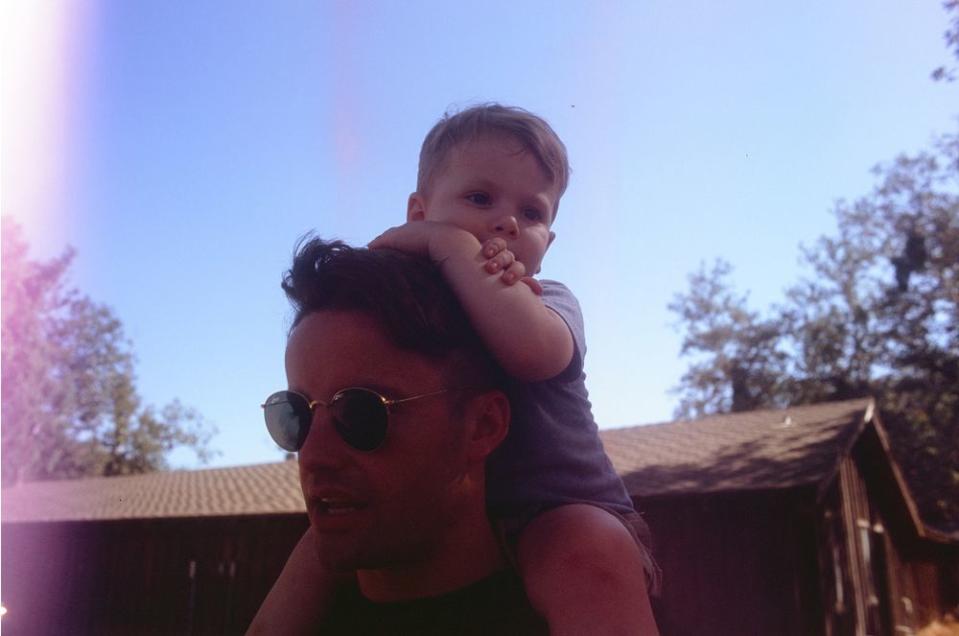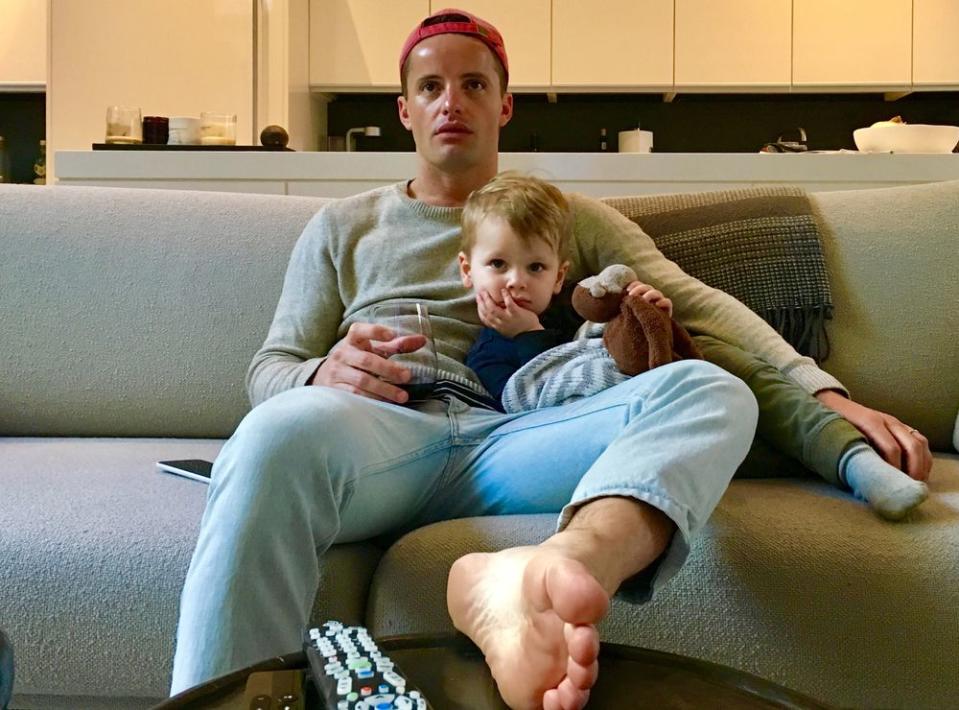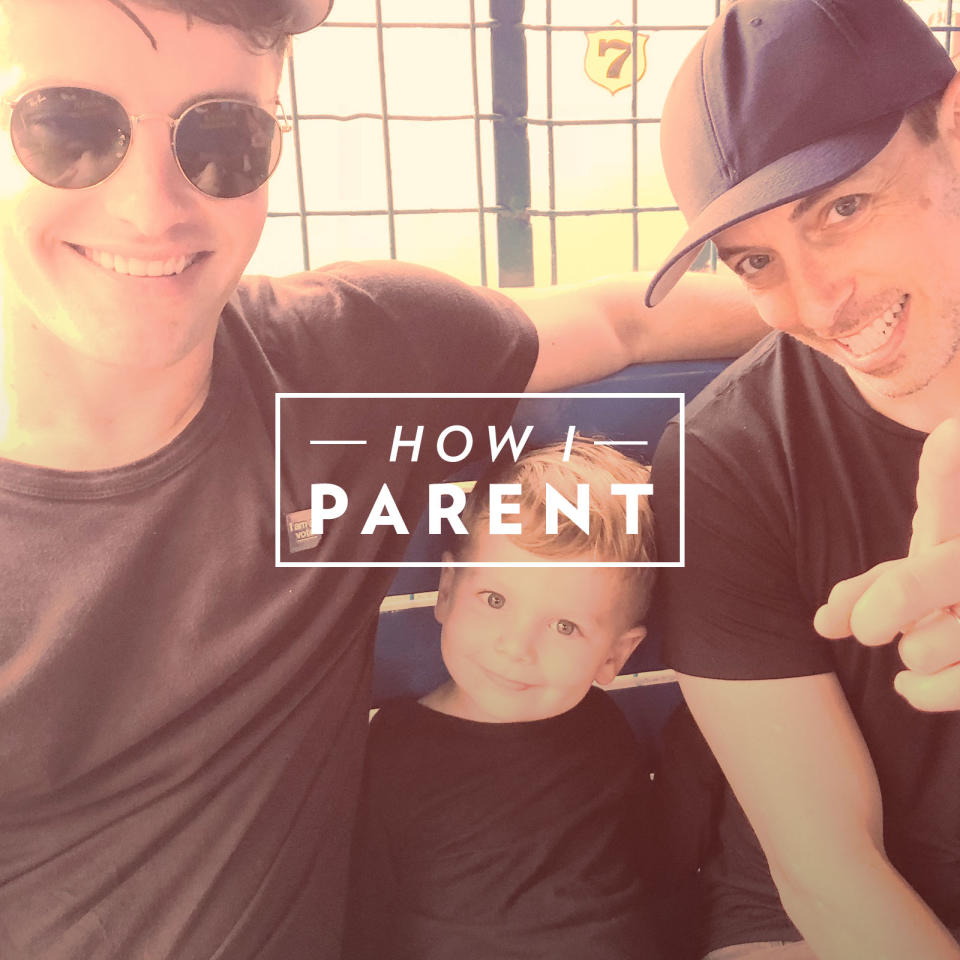How I Parent: A Dad in a Same-Sex Marriage Who Used a Surrogate to Have a Son
Name: Chase Weideman-Grant
Location: New York City, New York
Occupation: Adult Education at a Refugee Resettlement Agency
Family Situation: We are a family of three. Me, my husband, and my son Errol. Errol attends pre-school five days a week from 10 a.m. to 4 p.m. We don’t have any other help with childcare otherwise, nor have we ever. No judgment, we just haven’t had help.
Parenting “philosophy” in a sentence: Raise a person with whom you want to spend time, because you’re going to!

What was your journey to having the family life you have today?
My husband and I were living in L.A. when we decided we wanted to have a family. I researched all of the agencies in California and all of them had at least one person write a review saying they wouldn’t use that agency again, which gave me pause. The only agency I found that had a 100 percent return rate was Northwest Surrogacy Center, LLC in Portland, Oregon. We booked a flight that night and went up there to check it out.
When we got there, the team explained that their role in the process was to handle the vetting and selection of a surrogate. They go through an exhaustive process to ensure she is healthy and safe. Once ours was chosen, we got to have a Skype session with her. Afterwards, the team asked us if we had any issues or any reservations about her but she was lovely. The whole thing was an incredible process for us. I can only speak to our experience and our agency but they pretty much took care of everything.
We talked to our surrogate at least once a month during the pregnancy. She was living in rural Oregon at the time so getting there was difficult. It really wasn’t even an option for us so we would text and call. That was very much our personal choice. You can choose how involved or hands-off you want to be but for us, it just made more sense to be the most hands-off with our surrogate as possible. There’s no judgment against anyone who has gone a different way.
The process of choosing an egg donor, however, was different and interesting because there were a lot more legal aspects to be aware of. It was basically like online shopping for DNA. All we ever saw of the donor were her exhaustive medical records, a million photos of her throughout her entire life, and some academic records. We also got to hear about her family’s medical history but basically, she was just photos, forms, and a number. We called her a random name, Kimmy, and we still call her Kimmy; we didn’t want to call her No. 7542, which is all we ever knew.
About three days before our surrogate was due, we booked a flight to Oregon and savored our last moments of freedom. Then, when it was time, we actually induced her labor so we had the control to make sure we were there and I got to deliver our son. We were very, very lucky because we had no issues at all medically. From start to finish, it only took one year for us to take Errol home.
Everything about it was exciting but it’s a different psychological journey for same-sex parents. A lot of the romance can be taken out, literally and figuratively. When you feel ready, you basically just have to push a button. It’s a lot of paperwork, urine samples, saliva samples, blood work, and other things that are not so fun. It sort of makes you feel like there should be a “perfect time” but there’s never a perfect time. Regardless, we definitely plan on doing it all over again to expand our family in the future.

How did your upbringing influence your parenting style?
My upbringing could not have been more different from Errol’s. I was raised in Nebraska with very conservative, Christian parents. I was homeschooled, and I had a very sheltered, Christian, conservative upbringing.
Errol has gay dads. He lives in Greenwich Village and is surrounded by life in New York City. We live near Washington Square Park so he’s seen everything. He’s already lived more in three-and-a-half years than I think I did until I was 18.
As for my parenting style, I’m definitely a more structured, strict parent. My mom was that way for me. She was very regimented with us, and I’ve carried that on, and I appreciate that from her. Cory, my husband, is the fun one. His parenting style is so influenced by his upbringing because he was raised in a much more liberal, artistic household. That’s more in line with the way that we’re raising our child.
I really appreciate that Errol has access to so much vibrancy, culture, and life all around him at a young age. I didn’t have that as a child. I couldn’t even watch a lot of movies and I didn’t get to have many friends. Errol getting the full experience of life is the most important thing in my world. It’s not that I wasn’t raised well — I don’t want to make it sound like I was raised horribly. I was raised great, but he has a very different life and I want to ensure that he has a life that includes access to art, theater, and music — a city life. He’s a city boy.
What’s your favorite thing about parenting?
Parenting is very grounding. Of course, it’s fun and hilarious, no doubt, but there’s an immense, deep anchor that comes along with knowing you’re forever tied to another person. The love that grows and resides within that level of a human relationship is bigger and more momentous than I can explain. It’s really rocked me to the core.

What’s the hardest part?
The hardest part in the beginning was not being prepared enough. When Errol was born, the nurses mentioned in passing that babies didn’t drink water. I was like, “What? What do you mean they don’t drink water?” They looked at us like, “Oh God. Are you guys ready for this?” I also didn’t realize that when you have a kid, you will never sleep the same again. It’s not that you won’t sleep — you will. You will just never sleep the same. I haven’t reached a deep level of sleep in three-and-a-half years. I feel like I always have that proverbial one eye open. You just never really turn off your brain, ever. We also never had a nanny or childcare so it’s been full-on parent mode since the start.
As for those conversations about Errol having two dads, as opposed to having a mom and a dad, we’ve already had to have some that were completely unexpected because they happened so quickly. When Errol was about one-and-a-half years old, the kids in his class were around that age when they started crying for their mommies. So once he started talking at around two-and-a-half, he started crying for his mommy.
As an insecure human being with feelings, I took it very personally and didn’t know how to handle it. I thought that he was truly missing his mommy, which he doesn’t have. It made me feel distraught, vulnerable, and afraid of the future. But the next day, he was crying — I kid you not — for his lunchbox, which he also didn’t have. I didn’t even know how he even picked up the term “lunchbox.” I brought this up to his teacher and it turns out, there was a girl in his class who used her lunchbox as her security blanket. Every time she cried, she asked for her lunchbox, so all Errol was doing was regurgitating what the kids in school were saying when they were upset. Immediately I was like, “Oh my God, this is hilarious.”
Now he’s three-and-a-half and completely aware of his family status because we had the conversation. We’re also lucky his teachers read the kids books that help explain how all families look different. Some have two moms, two dads, a mom and a dad, and some have only one parent — but it’s all family. It’s all love. I’ve been surprised by how early schools have been putting that conversation in the classroom but it took the edge off of our job, even though we still have the conversation all the time. At three-and-a-half, he is very keenly aware that what makes a family a family is love and not the gender of the parents.
I think the idea of that conversation was always stressful for me. But the reality is so totally not scary because kids innately listen to their parents. They only really know what they learn in school, at home, and in their day-to-day lives. It’s [a parent’s] responsibility, so we talk to him very openly and candidly about it.
Am I afraid that he’s going to be bullied in high school because he has two dads? Of course. Is there anything I can do about it? Absolutely. Make him feel confident, secure, and loved. My hope is that Errol can look at that kid and be like, “Yeah? So? And? What’s your point? I have two dads. Are we done?”
How do you find time for yourself and your partner?
My partner and I both have rather flexible, relaxed work schedules, so we’re lucky in that regard. We make a concerted effort to eat dinner together as a couple most nights after Errol goes to sleep, even if we’re dog tired and it’s Chinese take out. We have date nights quite frequently.
I’m the first to admit that I am very good (probably too good) at making time for self-care and allowing myself the space to handle the things I need for me. Personally, feeling like an independent person with a life outside of chasing a toddler is a hugely important factor in being a successful parent. I use my “me time” to focus on exercise and skin care. Working out and doing face masks a few times a week are my time when I put up the proverbial “do not disturb” sign.

What’s the best advice you can share with new parents?
Raise your child to be someone you enjoy hanging out with.
How do you embrace the most unpredictable moments of parenthood?
Wine helps. Maybe a cocktail, or two. But on a serious note, parenting has taught me to be calm. I would not have describe myself as a calm person before being a dad. Things are unpredictable. Things are crazy, but I just try to be as calm as possible through out it all.
I am not a bulldozer parent. I don’t try to walk in front of him and clear away anything that may cause him confusion or fear or pain. Of course, I’m a parent who will always ensure my child is safe but we’re living life in New York. Things are crazy. If I was panicking around the clock, it wouldn’t help anybody so I take deep breaths and try to laugh things off.
Being a parent is hilarious. It is one of the most hysterical experiences of my life. My kid makes me laugh constantly. I don’t think that came naturally to me before fatherhood. That’s a decision I chose to make because what else are you gonna do? Things are going to happen anyway.
What would you want your kids to say about you as a parent?
I really hope that Errol would say that I prepared him well for life. That I did a good job in making him feel ready to live life, whatever his life might be. I want him to say that we were always open and honest with him and let him be who he wants to be. That’s my answer.


